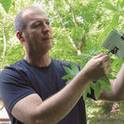- Garlic mustard is an invasive Eurasian biennial that has rapidly spread throughout the United States. In Southwestern Ohio, many garlic mustard populations are infected with Erysiphe cruciferarum, a causal agent of powdery mildew disease in Brassicaceous plants. We examined the regional distribution of E. cruciferarum on garlic mustard and determined the potential host range of E. cruciferarum on several native Brassicaceous species and selected Brassicaceous crop varieties. A survey of 19 natural areas in western Ohio revealed that populations of garlic mustard with high incidences of powdery mildew were largely centered in Montgomery and Greene Counties in Ohio, with disease incidence decreasing away from Dayton, Ohio. Sampling locations that were on level or southeast facing slopes had significantly higher disease incidences than those on northwest or southwest facing slopes. Five native spring ephemeral species, including four Cardamine species and one Arabis species, showed no obvious signs of E. cruciferarum infection in the field, but each became mildly to moderately infected when subjected to inoculum under greenhouse conditions. Of 12 Brassicaceous crop varieties tested, only one cultivar, Savanna Mustard (Brassica juncea) , became infected with powdery mildew in the greenhouse. Results from the greenhouse study show that under optimal conditions, some native spring mustard species can become infected with the same powdery mildew that infects garlic mustard, but they appear to phenologically escape from the disease in the field. Most Brassicaceous crop plants appear to be resistant, which may be due to breeding for powdery mildew resistance. Powdery mildew disease is prevalent at many sites in the field in Ohio and may impact garlic mustard with little realized risk for native and cultivated Brassicaceous speci
Available at: http://works.bepress.com/don-cipollini/37/
